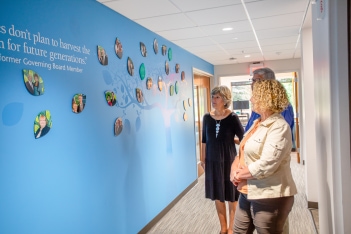
Nadja Newberry
Dayton Foundation donor Pat Meadows knows firsthand the challenges of paying for and staying in college. As the only daughter of four children, her parents and maternal grandmother set high expectations for her to ensure she was accepted into college after high school graduation.
“My grandmother paid a portion of my tuition, and along with a student loan and a work study job, I was able to cover the costs and complete my degree in four years,” Pat said.
Her gratitude for her family’s support, coupled with her desire to honor her late husband, Charles, inspired Pat to establish a renewable scholarship fund through the African-American Community Fund of The Dayton Foundation in 2021.
“As the son of an educator and one himself, Charles understood the importance and advantage of earning a degree. In our culture, advancing our education is one way to rise above limited resources and opportunities,” Pat said. “Through his work and community involvement, Charles knew how students struggle to pay for school. I hope this scholarship will honor my husband’s legacy and lighten the load for students to complete their goals.”

Pat and Charles Meadows
Another Foundation donor who knows the struggles of attaining an affordable education is Dr. David Ponitz, president emeritus of Sinclair Community College. In his 22 years as president, he worked to keep tuition costs down, with rates remaining the same during the last five years of his tenure.
Today, Dr. Ponitz continues to help make education affordable through the David Ponitz Completion Scholarship at Sinclair Community College, a fund which was established by the Thomas B. Fordham Institute through The Dayton Foundation to honor his years of service as a board member. Last year he donated an additional $50,000 to the fund, a gesture he made as part of the Foundation’s 100 Gifts to the Community centennial campaign. To date, $10,000 has been awarded from the fund to assist Sinclair students who demonstrate financial need and are nearing completion of their degrees.
“So often students may be only one quarter away from finishing their degrees and run out of the funding they need to complete them,” David said. “My hope is that my scholarship fund will help ensure more students are finishing their education, which I believe is key to personal development and success.”

Dr. David Ponitz
Though the increase in educational costs has slowed some in recent years due to COVID-19 and other factors, the majority of students still are taking on a serious amount of debt to complete their education. According to College Board, 55 percent of bachelor’s degree recipients from public and private nonprofit four-year colleges and universities in the 2019-20 academic year had an average debt of $28,400 upon graduation. Even more staggering is that 10 percent of student loan borrowers owed $80,000 or more as of March 2021.
Traditionally, scholarships have been offered primarily to help graduating high school seniors with costs for their first year of college. But rising costs aren’t just a barrier for students trying to get to college, says Michelle Brown, director of scholarship services for The Dayton Foundation, but also for students who are trying to finish their degrees.
My hope is that my scholarship fund will help ensure more students are finishing their education....
– Dr. David Ponitz, Foundation donor
“I often have students reaching out for help because they’ve exhausted other funding and can’t take on more debt,” Michelle said. “Of the 300 scholarship funds held by The Dayton Foundation, only 44 are renewable or completion scholarships. I hope to see this number increase, because while all of our scholarships are critical in helping youth pursue their education, renewable and completion scholarships absolutely are essential in helping some students to the finish line.”
Ensuring students finish their education without incurring significant debt amid increasing college costs were motivating factors behind Dayton-Montgomery County Scholarship Program’s recent decision to make its scholarship model renewable.

Completion scholarships help students who are nearing graduation to secure the funds they need to finish.
“The cost of higher education has increased roughly five times the rate of inflation. In society, earning a degree generally is valued, but students and families now are thinking more critically about that decision and ultimately the return on investment,” said Patrick Gill, PhD, executive director of DMCSP.
“Even though earning a college degree means higher projected lifetime earnings, students are experiencing the costs in real time and missing out on other opportunities. When life happens, higher education often is the first thing to go.” According to Patrick, DMCSP students now receive a total award of $5,000 with an annual amount that increases for their final two years. “The idea is to incentivize persistence, which ultimately will lead to graduation,” he said.
Renewable funding from The Charles A., Dhel L., and Katharine Funkhouser Memorial Scholarship of The Dayton Foundation is a big part of the reason Ohio State University graduate Nadja Dewberry was able to persist and achieve her dreams to become a graphic designer. When she began her studies in 2017, she found herself in a tricky spot. Her parents didn’t make enough money to pay for all of her tuition costs, but their income was too high for her to qualify for grants and other aid. She credits the consistent scholarship support throughout the entirety of her college career as one of the reasons she was able to obtain her degree.
“My scholarship helped to relieve some of the stress of finding the money to continue my education. I knew that if I kept my grades up, I could rely on those funds being there for me each year,” Nadja said. “As a college student, having that financial security offered me a degree of reassurance and stability.”
My scholarship helped to relieve some of the stress of finding the money to continue my education.
– Nadja Dewberry, scholarship recipient
Nadja graduated in 2021 with honors and is fulfilling her dreams by working at an ad agency. She is grateful to work in a field where, as she says, “My passion lives in me on a daily basis.”
“It almost feels like I’m not working, because I enjoy what I do so much,” she said. “I cannot say thank you enough for the scholarship and for investing in my education for four years. Many, many thanks to you!”








